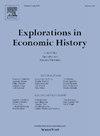近代早期英国的集聚与创造力
IF 1.7
1区 历史学
Q1 ECONOMICS
引用次数: 0
摘要
西方城市是什么时候成为现代理论家所设想的创造力引擎的?我们通过调查精英作家从早期现代伦敦的聚集中获益多少来解决这个问题。建立了一个新的面板数据集,记录了1482-1800年间2026位多产作者的居住地和年度出版物,我们进行了纵向作者水平分析。我们的研究结果表明,伦敦知识经济的集聚效益达到了与16世纪晚期现代城市相当的水平。在探索机制时,我们发现搬到伦敦改善了合作的机会,并相应提高了图书的质量。我们在18世纪引领英国工业革命的城镇中发现了类似的集聚经济(和机制)(但在此之前没有)。本文章由计算机程序翻译,如有差异,请以英文原文为准。
Agglomeration and creativity in early modern Britain
When did western cities become the engines of creativity modern theorists envision them to be? We approach this issue by investigating how much elite authors benefited from agglomerating in early modern London. Building a new panel dataset documenting the place of residence and annual publications of 2,026 prolific authors over the period 1482–1800, we conduct longitudinal author-level analyses. Our results suggest agglomeration benefits in London’s knowledge economy reached levels comparable to those documented in modern cities by the late 16th century. Exploring mechanisms, we find that moving to London improved opportunities for collaboration and, relatedly, the quality of books produced. We find similar agglomeration economies (and mechanisms) in the towns leading Britain’s industrial revolution in the 18th century (but not before).
求助全文
通过发布文献求助,成功后即可免费获取论文全文。
去求助
来源期刊

Explorations in Economic History
Multiple-
CiteScore
2.50
自引率
8.70%
发文量
27
期刊介绍:
Explorations in Economic History provides broad coverage of the application of economic analysis to historical episodes. The journal has a tradition of innovative applications of theory and quantitative techniques, and it explores all aspects of economic change, all historical periods, all geographical locations, and all political and social systems. The journal includes papers by economists, economic historians, demographers, geographers, and sociologists. Explorations in Economic History is the only journal where you will find "Essays in Exploration." This unique department alerts economic historians to the potential in a new area of research, surveying the recent literature and then identifying the most promising issues to pursue.
 求助内容:
求助内容: 应助结果提醒方式:
应助结果提醒方式:


